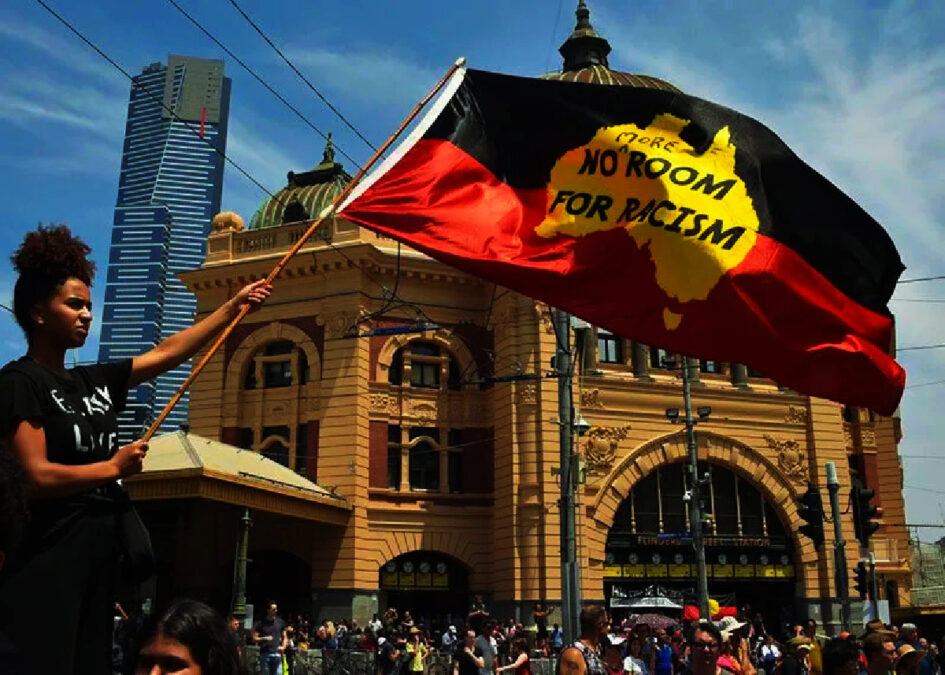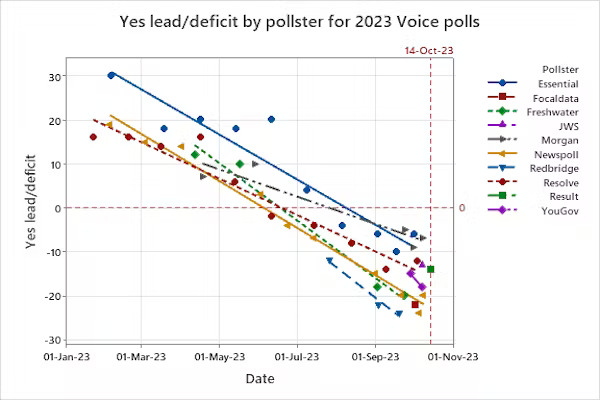By John Stapleton. Sources: Various.
Millions of words have been written over the past 18 months in Australia about a government proposal to create an Indigenous Voice to Parliament, an advisory body to represent the interests of the Nation’s First Peoples.
It has preoccupied the nation’s political class, filled television screens and the front pages of newspapers, ignited the left in what they saw as a noble cause, reinvigorated the Opposition, cost the taxpayer and estimated $400 million and left “Vote Yes” placards festooning the country.
Despite the massive resources put to it, including support from the corporate world, including Pfizer, Moderna, Facebook and Qantas, mining companies and sporting bodies, the heavily pushed Referendum failed decisively.
The final results according to the Australian Electoral Commission were 39.41% in favour and 60.59% against. The requirement for success in an Australian referendum, that a majority of the states as well as the overall vote be in favour, was also easily defeated.
Support for the Yes vote had been plummeting all year.
TO WATCH THE FULL UNFOLDING COVERAGE OF THIS EXTRAORDINARY MOMENT IN AUSTRALIAN HISTORY
THE GOVERNMENT FUNDED AUSTRALIAN BROADCASTING COMMISSION
Ironically, perhaps, some of the most entertaining coverage came from the Independent Media, which grew in power during the Covid era when the mainstream lost credibility thanks to its endless parroting of government propaganda. Rukshan Fernando went from being a wedding photographer to one of Australia’s most beloved pod-casters thanks to the the nation’s Covid overreach and his talent onscreen. His coverage with the ever controversial live-wire Avi Yemini of Rebel News is far more entertaining than the shocked and dour faces of the ABC.
POST REFERENDUM SPEECHES
Australia’s two major political leaders, Prime Minister Anthony Albanese from the left and Opposition Leader Peter Dutton for the conservatives, both gave what amounted to valedictory speeches for the Referendum.
Facing the worst moment in his political career, clearly shocked by the result, the Prime Minister grasped for dignity and sought to cast blame wherever he could.
“My fellow Australians, at the outset, I want to say that while tonight’s result is not one that I had hoped for, I absolutely respect the decision of the Australian people,’’ he said.
“And I say to the millions of Australians, all over our great country that voted yes with hope and goodwill.
“We are not yes voters or no voters. We are all Australian. We must take our country beyond this debate, without forgetting why we had it in the first place.”
“We argued that this change, not out of convenience, but from conviction. I believe it was the right thing to do.”
Opposition Leader Peter Dutton, who has grown in stature throughout the grueling campaign, placed the blame for the entire fiasco directly at the Prime Minister’s feet.
The Wash Up Was Cruel
There is a considerable amount of introspection and analysis from Australia’s left leaning intelligentsia in the wake of the Referendum’s defeat. There is also considerable delight on the other side of the cultural divide.
It was all so totally unnecessary.
What should have been obvious from the very beginning, and which should have given pause to those spending so much time, money and effort pushing the Yes vote, was the fact that many of the nation’s indigenous did not support the Voice.
The sight of the nation’s indigenous squabbling over The Voice was unseemly to say the least, Minister for Indigenous Australians Linda Burney doing herself no favours throughout the campaign.
On the other side of the divide, Opposition spokeswoman on Indigenous Affairs Senator Jacinta Price rose from relative obscurity to become a household name.
For Australia’s Labor government it has been a massive backfire.
A mortally wounded Prime Minister, one Anthony Albanese for international readers who understandably have trouble keeping up with the procession of short lived leaders in the Land Down Under, must now watch as his career goes gurgling down a political sinkhole.
Journalists hunt in packs, and packs attack the vulnerable.
After squandering some $400 million of public money on the failed Referendum, and having deeply divided the nation over the past 18 months, Albanese is in deep trouble. Adept at blame shifting after a lifetime in politics, this will require more than the usual bag of tricks if he has any chance of recovery.
There are calls for his resignation.
As pundit Paul Collits wrote: “The voice debate managed to remove all of Albanese’s other, manifest failings from the front pages, for a time. No doubt, he will now be exposed to much greater scrutiny on broader policy disasters. The absence of a proper Covid inquiry, the housing debacle, the costs of rampant immigration, the cost-of-living crisis, the scandal of Aboriginal funding mis-management, the limp responses to Arab terrorism, and the rest. It is a long list. There is talk of looking for another Labor leader. All in his first term of office.”
All the states voted No, along with the Northern Territory. The only area in the country that voted Yes was the Australian Capital Territory, where the capital, Canberra, lies.
As Collits observed: “These numbers say something deeply disturbing about Australia’s governance. Most of Canberra’s residents are public servants or those who work in some other way for the State. It is a town full of policy-makers. Comfortable policy-makers of the Covid laptop class. These are the people who run Australia’s Government. Who come up with globalist schemes like offshoring pandemic management, covering the country with wind farms and solar panels, doing away with cars, de-industrialising, misinformation legislation and digital ID. Schemes never asked for by voters beyond Canberra’s borders. Those who reside in Canberra remain utterly, indeed, blissfully, untouched by the tedious goings on elsewhere.
“And they have absolutely nothing in common with ordinary Australians. As the geography of the referendum outcome amply demonstrates.”
Many Australians are angry at the extravagance, the waste and the divisiveness that has consumed the political sphere at the same time as the average punter is struggling to make ends meet during a cost of living crisis, the cost of electricity, petrol, mortgages and groceries all soaring.
The decision to hold a Referendum on The Voice was always vacuous. It was always conceived by out of touch bureaucrats and the elites of the Aboriginal industry who have done very well on magnificent salaries and large grants championing the multiple related causes of indigenous disadvantage.
Instead of adding to their armour, the Voice campaign has exposed the waste of many Australian government programs, with a live question now being: “What does the $30 billion a year spent on indigenous causes actually achieve?”
The hundreds of billions of dollars funneled through Canberra bureaucracies and spent on indigenous causes is raked off the backs of Australia’s increasingly impoverished working poor.
Australia has just been though a nation wide convulsion of angst, racial slurs, callow political grandstanding, bureaucratic idiocy and an appalling display of government and corporate malfeasance, the likes of which we have never seen before. And a fed up Australian public have said: “NO”.



